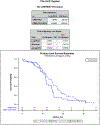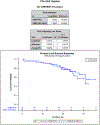Phase I and Randomized Phase II Study of Ruxolitinib With Frontline Neoadjuvant Therapy in Advanced Ovarian Cancer: An NRG Oncology Group Study
- PMID: 38776484
- PMCID: PMC11551860
- DOI: 10.1200/JCO.23.02076
Phase I and Randomized Phase II Study of Ruxolitinib With Frontline Neoadjuvant Therapy in Advanced Ovarian Cancer: An NRG Oncology Group Study
Abstract
Purpose: The interleukin-6/Janus kinase (JAK)/signal transducers and activators of transcription 3 axis is a reported driver of chemotherapy resistance. We hypothesized that adding the JAK1/2 inhibitor ruxolitinib to standard chemotherapy would be tolerable and improve progression-free survival (PFS) in patients with ovarian cancer in the upfront setting.
Materials and methods: Patients with ovarian/fallopian tube/primary peritoneal carcinoma recommended for neoadjuvant chemotherapy were eligible. In phase I, treatment was initiated with dose-dense paclitaxel (P) 70 mg/m2 once daily on days 1, 8, and 15; carboplatin AUC 5 intravenously day 1; and ruxolitinib 15 mg orally (PO) twice a day, every 21 days (dose level 1). Interval debulking surgery (IDS) was required after cycle 3. Patients then received three additional cycles of chemotherapy/ruxolitinib, followed by maintenance ruxolitinib. In the randomized phase II, patients were randomly assigned to paclitaxel/carboplatin with or without ruxolitinib at 15 mg PO twice a day for three cycles, IDS, followed by another three cycles of chemotherapy/ruxolitinib, without further maintenance ruxolitinib. The primary phase II end point was PFS.
Results: Seventeen patients were enrolled in phase I. The maximum tolerated dose and recommended phase II dose were established to be dose level 1. One hundred thirty patients were enrolled in phase II with a median follow-up of 24 months. The regimen was well tolerated, with a trend toward higher grade 3 to 4 anemia (64% v 27%), grade 3 to 4 neutropenia (53% v 37%), and thromboembolic events (12.6% v 2.4%) in the experimental arm. In the randomized phase II, the median PFS in the reference arm was 11.6 versus 14.6 in the experimental, hazard ratio (HR) for PFS was 0.702 (log-rank P = .059). The overall survival HR was 0.785 (P = .24).
Conclusion: Ruxolitinib 15 mg PO twice a day was well tolerated with acceptable toxicity in combination with paclitaxel/carboplatin chemotherapy. The primary end point of prolongation of PFS was achieved in the experimental arm, warranting further investigation.
Trial registration: ClinicalTrials.gov NCT02713386.
Conflict of interest statement
DECLARATION OF INTERESTS
The following authors wish to report that they have no conflicts of interest to disclose: Drs. Charles Landen, Joan Walker, Erin Bishop, Mary Gordimer, and Robert A Burger.
Dr. Ronald Buckanovich reports that the study drug was provided by CTEP and that He has a funded contract work with Sophrosyne studying ALDH inhibitors. He acknowledges that he has personally received payments/honoraria from the Medical College of Wisconsin Lecture honoraria and the University of Kentucky (for lecture). In addition, OCRA advisory board paid honoraria which was gifted back to OCRA. Dr. Buckanovich also has patents for ALDH inhibitor, EGFL6 antibody patent and FTS antibody patent pending. He also participated on the Galapagos Advisory Board. He is a co-founder of Tradewind Bioscience but has had no income from this relationship.
Dr. Sill reports serving as a reviewer for the Sabin Family Foundation Fellowship Award for The University of Texas MD Anderson Cancer Center. Additionally, he receives payment as a Teacher at the University of Buffalo. He also has received support for attending NRG semi-annual meetings.
Dr. Robert Mannel reports capitation payments to his Institution for trial support for the present manuscript received from NCI/NRG Oncology Group. Dr. Mannel also served as NRG Oncology Group Chair and received grants to his Institution from NIH as well as the GOG Foundation for salary support. Dr. Paul DiSilvestro reports receiving consulting fees from AstraZeneca, GSK/Tesaro and Immunogen.
Dr. Cara Mathews reports receiving support for the present manuscript from NCI to her Institution. Additionally, Dr. Mathews reports funding paid to her Institution from Syros, Deciphera, Astellas Pharma, Seagen, Genmab, EMD Serono, Merck, Regeneron, Moderna, Astra Zeneca, AvengeBio, Zentalis, GlaskoSmithKline, Immunogen, Elucida and Genentech outside of the submitted work.
Dr. David Mutch reports serving in a Leadership role for the Foundation for Womens Cancer (unpaid).
Dr. Marcia Hernandez reports provision of study materials and patients as well as travel funds to attend NRG meetings biannually. Dr. Hernandez also owns retirement plan 403B stocks and mutual funds as well as personal investment polio with all holdings representing less than 5% interest in any individual company.
Dr. Lainie Martin reports institutional funding for clinical trial activities received from the following: Agenusbio, Inc, AstraZeneca, Sutro Biopharma, Inc. Immunogen, Inc., Mersana Therapeutics, and XenCor, Inc. Dr. Martin also reports serving on the Advisory Board for both Elucida Oncology, Inc, Sutro Biopharma, Inc. and ImmunoGen, Inc.
Dr. Carol Aghajanian reports clinical trial funding to her Institution (MSK) from the following: AbbVie, AstraZeneca, Clovis, and Genentech/Roche. Dr. Aghajanian reports receiving consulting fees from Roche/Genentech, Eisai/Merck, AstraZeneca/Merck and Repare Therapeutics. Additionally, Dr. Aghajanian served on the Advisory Board from 6/30/2021 for Blueprint Medicine (no consulting fee received). She served on the GOG Foundation, Board of Directors (unpaid, occasional travel cost reimbursement to attend meetings) and the NRG Oncology Board of Directors (unpaid).
Dr. Joyce Liu reports funding to Dana-Farber Cancer Institute for trials on which she serves as the PI: 2X Oncology, Aravive, Arch Oncology, AstraZeneca, Bristol-Myers Squibb, Clovis Oncology, GlaxoSmithKline, Impact Therapeutics. Regeneron, Figeo Therapeutics and Zentalis Pharmaceuticals. Dr. Liu received consulting fees for Advisory Board participation for AstraZeneca, Daiichi Sanko, Eisai, Genentech, GlaxoSmithKline, Regeneron Therapeutics and Zentalis Pharmaceuticals as well as Consulting fees for Bristol-Myers Squibb, Clovis Oncology and Genentech. Finally, Dr. Liu acknowledges serving as Ovarian Subcommittee Co-Chair for NRG Oncology as well as serving on the Scientific Advisory Board Co-Chair for Tina’s Wish.
Dr. Kathleen Moore reports research funding to her Institution from PTC Therapeutics, Lilly, Clovis, Genentech, GSK, Verastem and personally received royalties from Up to Date. Dr. Moore also reports personally receiving consulting fees from AstraZeneca, Aravive, Alkermes, Aadi and Blueprint pharma, Clovis, Caris, Eisai, GSK, Genentech/Roche, Hengrui, Immunogen, Inxmed, IMab, Iovance Biotherap, Lilly, Mereo, Mersana, Merck, Myriad, Novartis, Novocure, Panavance, OncXerna, Onconova, Tarveda, VBL Therapeutics, Verastem. Dr. Moore received personal honoraria from AstraZeneca, GSK, Immunogen, PRIME, RTP, Medscape, Great Debates and Updates. Additionally, AstraZenea provided support to Dr. Moore for travel. Dr. Moore serves as the Associate Director for GOG Partner. Dr. Michael A Bookman reports consultation fees paid to his Institution for serving on ad-hoc advisory boards for Genentech-Roche, Merck Sharp & Dohme, AstraZeneca, Clovis Oncology, Seattle Genetics, Aravive and AbbVie. Dr. Bookman also acknowledges that he served on the Data Monitoring Committee for Immunogen for which his Institution receiving compensation.
Figures


References
Publication types
MeSH terms
Substances
Associated data
Grants and funding
LinkOut - more resources
Full Text Sources
Medical
Research Materials
Miscellaneous

